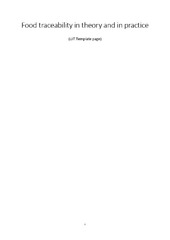Blar i forfatter "Olsen, Petter"
-
Applications, limitations, costs, and benefits related to the use of blockchain technology in the food industry
Olsen, Petter; Borit, Melania; Syed, Shaheen (Research report; Forskningsrapport, 2019-02)This report was commissioned to outline applications, limitations, costs, and benefits related to the use of blockchain technology in the food industry, and in particular to evaluate the pros and cons of having a blockchain-based food traceability system compared to a traditional electronic traceability system. The key concepts relating to traceability, and the components of a food traceability ... -
Beyond regulatory compliance – Seafood traceability benefits and success cases
Borit, Melania; Olsen, Petter (Research report; Forskningsrapport, 2020)Since the mid-1990s, traceability has become a popular concept in industrial logistics, regardless of the production regime and type of product. Implementing traceability systems across the food supply chain is seen as crucial for increasing food quality and safety, for optimizing production or for documenting sustainability. However, implementation of traceability systems in the seafood sector seems ... -
The components of a food traceability system
Olsen, Petter; Borit, Melania (Journal article; Tidsskriftartikkel; Peer reviewed, 2018-05-03)<p><i>Background</i>: Traceability of food products has become the focus of regional and national legislation, of many research and technical development initiatives and projects, and of many scientific articles. However, most of the scientific publications do not differentiate between the components of a traceability system, and those who do to some degree use inconsistent terminology and definitions. ... -
Food traceability in theory and in practice
Olsen, Petter (Doctoral thesis; Doktorgradsavhandling, 2018-01-12)The thesis consists of five papers and a synopsis, and outlines theoretical concepts and practical considerations when implementing traceability in food supply chains. The term traceability and the components of a traceability system are discussed and defined, a method for describing and analysing material flow, information flow, and information loss is outlined, and numerous practical implementations ... -
A framework for results-based management in fisheries
Nielsen, Kåre Nolde; Aschan, Michaela; Agnarsson, Sveinn; Ballesteros, Marta; Baudron, Alan; Borges, Maria de Fatima; Campos, Aida; Chapela, Rosa; Daníelsdóttir, Anna Kristin; Erzini, Karim; Gregersen, Olavur; Holm, Petter; Lucchetti, Alessandro; Margeirsson, Sveinn; Mendes, Hugo Vilela; Olsen, Petter; Rangel, Mafalda; Sala, Antonello; Santiago, José Luis; Sigurdardottir, Sigridur; Silva, Cristina; Sykes, Daryl; Vidarsson, Jonas Runar; Virgili, Massimo; Wise, Laura; Fernandes, Paul George (Journal article; Tidsskriftartikkel; Peer reviewed, 2017-10-30)We present a framework for results-based management (RBM) of commercial fisheries. The core idea of RBM is to reduce micromanagement by delegating management responsibility to resource users. The RBM framework represents an industrial organization approach to co-management and comprises three defining processes, conducted by three independent “agents”: (i) an “authority” defines specific and ... -
Guidelines for co-creating climate adaptation plans for fisheries and aquaculture
Pham, Thi Thanh Thuy; Friðriksdóttir, Ragnhildur; Weber, Charlotte Teresa; Viðarsson, Jónas R.; Papandroulakis, Nikos; Baudron, Alan; Olsen, Petter; Arias-Hansen, Juliana; Laksá, Unn; Fernandes, Paul G.; Bahri, Tarub; Ragnarsson, Sigurður Ö; Aschan, Michaela (Journal article; Tidsskriftartikkel; Peer reviewed, 2021-02-27)Climate change is having a significant impact on the biology and ecology of fish stocks and aquaculture species and will affect the productivity within seafood supply chains in the future. The challenges are further amplified when actors within the fisheries and aquaculture sectors have very different ideas and assumptions about climate change and what risks and opportunities they entail. In order ... -
Representations of Colonialism in Three Popular, Modern Board Games: Puerto Rico, Struggle of Empires, and Archipelago
Borit, Cornel; Borit, Melania; Olsen, Petter (Journal article; Tidsskriftartikkel; Peer reviewed, 2018-04-10)With all its intricate processes, colonialism, both as an ideology and a historical period, has been a rich source of inspiration for contemporary popular culture, whether in the form of movies, novels, digital games, or analogue games. This article presents a critical analysis of colonial representations in three examples of the latter: <i>Puerto Rico</i> (2002), <i>Struggle of Empires</i> (2004), ... -
Should traceability systems in the food industry be based on blockchain technology?
Olsen, Petter (Conference object; Konferansebidrag, 2021-02-18) -
Towards enhancing trustworthiness of socially interactive and culture aware robots
Borit, Melania; Vanhée, Loïs; Olsen, Petter (Journal article; Tidsskriftartikkel, 2014-05-05)Building fine-tuned socially believable autonomous agents interacting with humans in virtual environments is an important aspect of agent design, as humans are influenced more by virtual agents with a high degree of behavioral realism. However, modeling complex psychological processes such as the trust-building between humans and culturallyadaptable agents in a realistic manner is not a trivial task. ... -
Økt lønnsomhet i torskesektoren. Sluttrapport
Dreyer, Bent; Bendiksen, Bjørn Inge; Henriksen, Edgar; Hermansen, Øystein; Holm, Petter; Iversen, Audun; Karlsen, Kine Mari; Svorken, Marianne; Isaksen, John Roald; Olsen, Petter; Sørdahl, Patrick Berg (Research report; Forskningsrapport, 2016-10-19)Rapporten gir en oversikt over aktivitet og funn i programmet «Økt lønnsomhet i torskesektoren». Programmet ble startet opp i 2011 og avsluttet sommeren 2016. Rapporten er organisert på følgende måte. Først redegjøres det for intensjonene med programmet. Deretter redegjøres det for hvordan programmet har vært organisert. Så gis det en oversikt over de ulike leveransene i programmet og ...


 English
English norsk
norsk








